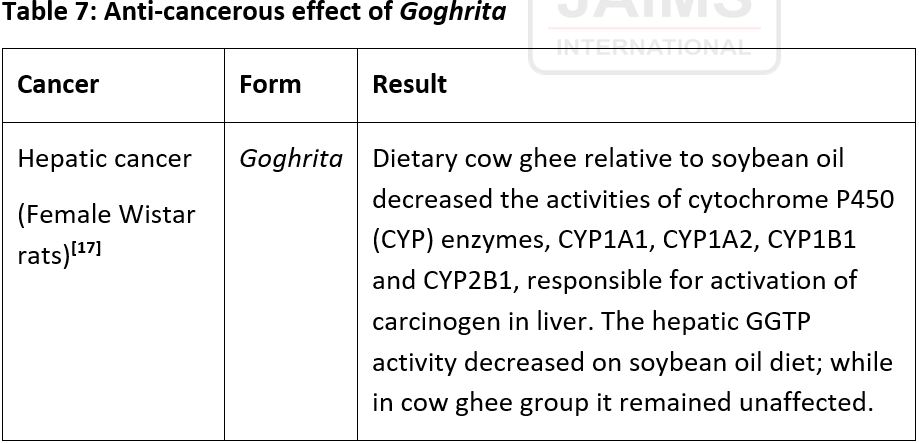Exploring the Anti-cancer Potential of Amrutham Ghrita: A Review
DOI:
https://doi.org/10.21760/jaims.10.4.22Keywords:
Cancer, Ayurveda, Dushivisha, Amrutham Ghrita, immunomodulatory, antioxidantAbstract
Cancer, a leading cause of mortality worldwide, is largely attributed to modern lifestyles and environmental toxins. Current treatment options, such as chemotherapy and radiotherapy, are expensive and associated with adverse effects. In the context of Ayurveda, the concept of management of Dushivisha (i.e., cumulative toxicity) offers a promising approach to cancer management. This review focuses on Amrutham Ghrita, a classical Ayurvedic formulation, and its potential anticancer properties. Our analysis of various research papers reveals that the constituents of Amrutham Ghrita, exhibit immunomodulatory, antioxidant, and works against complications arises due to chemotherapy. The results suggest that Amrutham Ghrita may be a novel, cost-effective, and safe adjuvant therapy for management caused by complications aroused due to chemotherapy. This review provides a foundation for future research in this area highlighting the potential of Ayurvedic medicine in addressing the global burden of cancer.
Downloads
References
Anand P, Kunnumakkara AB, Sundaram C, Harikumar KB, Tharakan ST, Lai OS, et al. Cancer is a preventable disease that requires major lifestyle changes. Pharm Res. 2008;25(9):2097–116. doi: 10.1007/s11095-008-9661-9.
Cancer-Causing Substances in the Environment. Cancer.gov [Internet]. 2022 Jun 17 [cited 2025 May 29]. Available from: https://www.cancer.gov/about-cancer/causes-prevention/risk/substances
Sushruta. Sthavarvishavighaniya. In: Shastri A, editor. Sushruta Samhita. Varanasi: Chaukhambha Sanskrit Sansthan; 2022. p. 32–3.
Vagbhata. Ashtanga Sangraham. In: Thirumulpad KR, editor. Uttarasthana. Chalakudy, Kerala: Vaidyabhooshanam K Raghavan Thirumulpad; 1999. 2nd ed. p. 30.
Rahamooz Haghighi S, Asadi MH, Akrami H, Baghizadeh A. Anti-carcinogenic and anti-angiogenic properties of the extracts of Acorus calamus on gastric cancer cells. Avicenna J Phytomed. 2017;7(2):145–56. Available from: https://www.ncbi.nlm.nih.gov/pmc/articles/PMC5355820/
Das BK, Swamy AV, Koti BC, Gadad PC. Experimental evidence for use of Acorus calamus (asarone) for cancer chemoprevention. Heliyon [Internet]. 2019 [cited 2025 May 29];5(5):e01585. Available from: http://dx.doi.org/10.1016/j.heliyon.2019.e01585.
Weng JR, Yen MH, Lin WY. Cytotoxic constituents from Celastrus paniculatus induce apoptosis and autophagy in breast cancer cells. Phytochemistry. 2013;94:211–9. Available from: https://doi.org/10.1016/j.phytochem.2013.05.022.
Kavitha CN, Raja KD, Rao SK. Antitumor activity of Albizia lebbeck L. against Ehrlich ascites carcinoma in vivo and HeLa and A549 cell lines in vitro. J Cancer Res Ther. 2021;17(2):491–8. Available from: https://doi.org/10.4103/jcrt.JCRT_454_19.
Padamanabhan V, Ganapathy M, Evanjelene VK. Evaluation of in vivo anticancer activity of Albizia lebbeck Benth. WJPPS. 2016;5(6):1130–42. Available from: https://www.wjpps.com/Wjpps_controller/abstract_id/5265.
Sivaraj C, Saraswathi K, Arumugam P, Baskar R, Manimaran A. GC-MS analysis, antioxidant, antibacterial and anticancer activities of methanol bark extract of Albizia lebbeck (L.). J Phytopharmacol. 2019;8(4):177–84. Available from: https://phytopharmajournal.com/assets/pdf_files/Vol8_Issue4_06.pdf.
Singh RK, Verma PK, Kumar A, Kumar S, Acharya A. Achyranthes aspera L. leaf extract induced anticancer effects on Dalton's lymphoma via regulation of PKCα signaling pathway and mitochondrial apoptosis. J Ethnopharmacol. 2021;274:114060. Available from: https://doi.org/10.1016/j.jep.2021.114060.
Subbarayan PR, Sarkar M, Impellizzeri S, Raymo F, Lokeshwar BL, Kumar P, et al. Anti-proliferative and anti-cancer properties of Achyranthes aspera: specific inhibitory activity against pancreatic cancer cells. J Ethnopharmacol. 2010;131(1):78–82. Available from: https://doi.org/10.1016/j.jep.2010.06.002.
Chaudhary S, Chandrashekar KS, Pai KS, Setty MM, Devkar RA, Reddy ND, Shoja MH. Evaluation of antioxidant and anticancer activity of extract and fractions of Nardostachys jatamansi DC in breast carcinoma. BMC Complement Altern Med. 2015;15:50. doi: 10.1186/s12906-015-0563-1. PMID: 25886964; PMCID: PMC4364107. Available from: https://www.ncbi.nlm.nih.gov/pmc/articles/PMC4364107/.
Lee GW, Hur W, Kim JH, Park DJ, Kim SM, Kang BY, et al. Nardostachys jatamansi root extract attenuates tumor progression in hepatocellular carcinoma via inhibition of ERK/STAT3 pathways. Anticancer Res. 2021;41(4):1883–93. doi: 10.21873/anticanres.14954. PMID: 33813393. Available from: https://pubmed.ncbi.nlm.nih.gov/33813393/.
Dhama K, Chauhan RS, Singhal L. Anticancer activity of cow urine: current status and future directions. Int J Cow Sci. 2005;1(2):1–25. Available from: https://www.researchgate.net/publication/229596973.
Kaur I, Sharma A, Malik YS. Anticancer activity of cow urine distillate: an update. Int J Cow Sci. 2021;6(2):3–5. Available from: https://www.researchgate.net/publication/362279283.
Rani R, Kansal VK. Effects of cow ghee (clarified butter oil) and soybean oil on carcinogen-metabolizing enzymes in rats. Indian J Med Res. 2012;136(3):460–5. PMID: 23041740; PMCID: PMC3510893. Available from: https://www.ncbi.nlm.nih.gov/pmc/articles/PMC3510893/.















